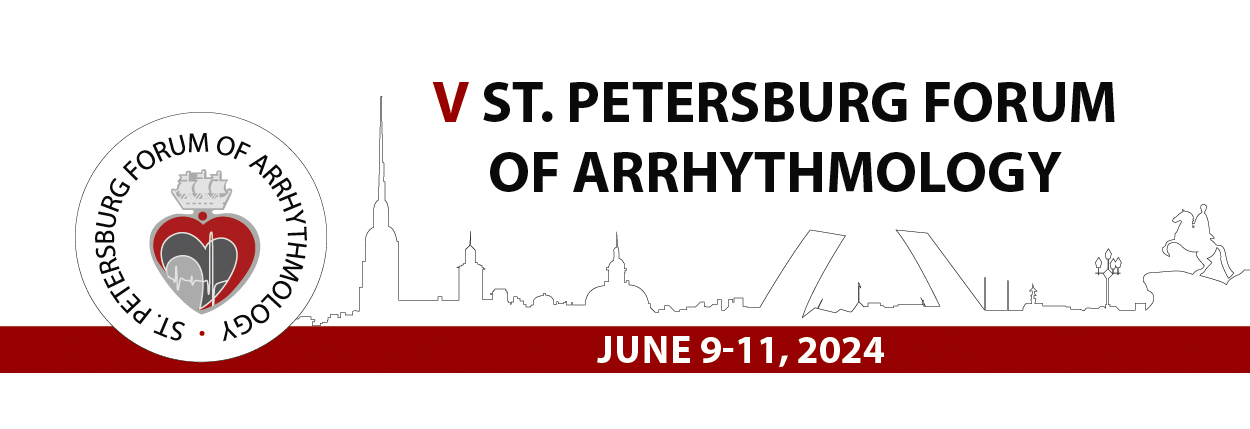
From June 9th to 11th, the V St. Petersburg Forum of Arrhythmology took place in Saint Petersburg. The event was organized by the Russian Society of Cardiology, Russian Society of Arrhythmology and Almazov National Medical Research Centre and was held as part of the programme of the World-Class Research Centre for Personalized Medicine.
The St. Petersburg Forum of Arrhythmology is a significant event in the scientific world. Arrhythmology is a modern, rapidly developing field of medicine that combines clinical traditions, basic research and new technologies. The Forum’s extensive programme included a comprehensive range of topics at the forefront of modern science, such as clinical and interventional arrhythmology, pediatric, sports and geriatric arrhythmology, the molecular and structural basis of arrhythmias, methods of imaging and functional testing in arrhythmology, approaches to prevention and treatment of cardiovascular diseases directly related to arrhythmias. The event was undoubtedly enhanced by the comprehensive coverage of the fundamentals of heart rhythm disorders, including basic and experimental arrhythmology, as well as mathematical modelling in electrophysiology, presented by leading scientists from around the globe.

The first day of the event was a special one, as it was dedicated to commemorating the legacy of Professor Dmitry Egorov – the esteemed founder of the Leningrad scientific school of arrhythmia surgery and cardiac pacing. There was also a dedicated session in honour of the brightest personalities in Russian arrhythmology. Additionally, on the first day, a series of symposia were held on the fundamental basis of heart rhythm disorders, a traditional highlight of the St. Petersburg Arrhythmology Forum. Leading scientists from the USA, Germany, China, New Zealand, the Netherlands and other countries delivered presentations. Also on the first day, the always popular session on Teamwork in the Inpatient and Outpatient Settings was held for nurses and physicians of related specialties.

The official opening of the Forum took place on the second day. The Forum was traditionally opened by Evgeny Shlyakhto, Academician of the Russian Academy of Sciences, President of the Russian Society of Cardiology, and Director General of Almazov Centre. He highlighted the significant social impact of heart rhythm disorders in the Russian Federation, emphasizing the associated risks of morbidity, mortality, and a significant economic burden on the state.
The distinguished guests included Academician of RAS Amiran Revishvili, Academician of RAS Elena Golukhova, Academician of RAS Sergey Popov, and Professor Yang Yao, Chief Arrhythmologist of China. The Forum opening was welcomed by Oleg Ergashev, Vice-Governor of St. Petersburg. He noted that the Forum is an important event for the city, which is a Russian health resort and a major centre for medical personnel training, as well as the largest scientific and methodological medical centre, and is crucial for the its continued development and attracting guests. In the plenary session, the key issues and directions of strategic development of modern arrhythmology in Russia and the world were highlighted by the guests of honour.

The Forum discussed a number of important issues related to modern arrhythmology, including the fundamentals, various aspects of diagnostics, drug and interventional approaches to the treatment of cardiac rhythm and conduction disorders. In addition, a number of thematic sessions were held for nurses, a session for anaesthesiologists, a symposium on the development of arrhythmology care in new regions and others. The Forum provided a discussion platform for free speeches on scientific and practical topics. A total of 94 scientific symposia were held, with 26 symposia sponsored by manufacturing and pharmaceutical companies, 387 speakers delivered 443 presentations.


The Forum also featured an exhibition showcasing the latest diagnostic and treatment technologies for cardiac arrhythmias, as well as medications.
A Young Scientist Award was also announced as part of the Forum. The winners (Vyacheslav Korepanov, Alexandra Mamarina and Roman Ushakov) were presented with prizes, including trips to the XI Russian Congress of Arrhythmology in Krasnoyarsk in 2025, a trip to the XII St. Petersburg School of Arrhythmology in October 2024, and a training course at the Academy of Arrhythmology of Almazov Centre.
The Forum brought together more than 2,000 participants, both onsite and online.
The next 6th edition of St. Petersburg Forum of Arrhythmology is scheduled for 11–13 June 2026.









